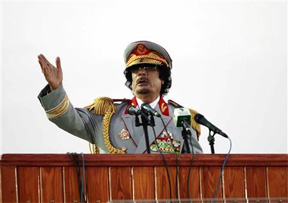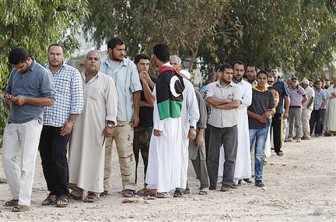MISRATA, Libya, (Reuters) – Muammar Gaddafi’s body lay in an old meat store today as arguments over a burial, and his killing after being captured, dogged efforts by Libya’s new leaders to make a formal start on a new era of democracy.

With a bullet wound visible through the familiar curly hair, the corpse shown to Reuters in Misrata bore other marks of the violent end to a violent life, still being broadcast to the world on looping snatches of grainy, gory cellphone video.
The interim prime minister offered a tale of “crossfire” to explain the fallen strongman’s death after he was dragged, very much alive, from a highway drain in his hometown of Sirte. But seeing him being beaten, while demanding legal rights, to the sound of gunfire, many assume he was simply summarily shot.

Gaddafi’s wife, Aisha, who found refuge in neighbouring Algeria while her husband and several sons kept their word to fight to the death, was reported to want an inquiry from the United Nations. Its human rights arm said one was merited.
Controversy over the final moments of a man who once held the world in thrall with a mixture of eccentricity and thuggery raised questions about the ability of Libya’s National Transitional Council to control the men with guns, as well as discomfort for Western allies about respect for human rights among those who claimed to be fighting for just those ideals.
The body appeared to be the latest object of wrangling among the factions of fighters who overthrew him — along with control of weapons, of ministries and of Libya’s oil wealth.
Libyans, and the Western allies who backed the revolt that ended Gaddafi’s 42-year rule two months ago, have indicated their impatience to begin what the United States declared was a democratic “new era”. NATO was expected to agree on Friday to start winding down its seven-month air campaign over Libya.
But regional and other rivalries have been holding up the disposal of the corpse of Gaddafi, who was seized by fighters on Thursday, and a formal declaration of Libya’s “liberation”.
Burial dispute
“They are not agreeing on the place of burial. Under Islam he should have been buried quickly but they have to reach an agreement whether he is to be buried in Misrata, Sirte, or somewhere else,” a senior NTC official told Reuters.
Others said talks were under way with members of Gaddafi’s tribe to dispose of him in secret, avoiding creating a shrine.
In Misrata, a local commander, Addul-Salam Eleiwa, showed off the body, torso bare, on a mattress inside a metal-lined cold-store by a market. He said: “He will get his rights, like any Muslim. His body will be washed and treated with dignity. I expect he will be buried in a Muslim cemetery within 24 hours.”
But amid the rumour and counter-rumour swirling between Sirte, Gaddafi’s last bastion, and Misrata, whose siege at his hands made it a symbol of resistance, nothing was certain.
Interim oil minister Ali Tarhouni said he urged colleagues to hold off burying Gaddafi for several days. Dozens of people, many with cellphone cameras, filed in to see that he was dead.
In a small triumph for those who were inspired by Arab Spring uprisings elsewhere to launch the rebellion in February in Benghazi, the eastern city was chosen as the venue for NTC chairman Mustafa Abdel Jalil to make announce the whole country liberated on Saturday, several NTC officials told Reuters.
That will set a clock ticking on a tentative timetable for drafting a constitution, under which full parliamentary elections would, Libyans hope, take place within a year or two.
There has been tension between the easterners and leaders from Misrata, Tripoli and other western cities, who take credit for overrunning the capital in August and complain they are under-represented in an interim government which has yet to move fully to Tripoli. Under the post-liberation plan, that is supposed to happen within weeks, though some in Benghazi, home to much of the oil industry, are keen to decentralise power.
As shown by the delay over burying Gaddafi, in defiance of Muslim custom which normally dictates interment before sundown, differences of opinion in a country that spent 42 years obeying the whims of one man take time to work out – time that worries some observers in light of the heavy weaponry that abounds.
The uncertain whereabouts of Saif al-Islam, Gaddafi’s son and heir-apparent, believed by NTC officials to have escaped from besieged Sirte and be heading for a southern border, may also distract from the process of switching from war to peace.
And without the glue of hatred for Gaddafi and his clan, some fear a descent into the kind of strife that bedevils Iraq after Saddam Hussein, even if Libya lacks its sectarian divide. Optimists point to how, in two months of controlling Tripoli, the Libyan factions have argued but, so far, not fought.
“Can an inclusive, effective national government be formed? Yes, if factions can avoid fighting,” Jon Marks, chairman of Britain’s Cross Border Information consultancy said. “So it’s all about the politics, and the $64,000 question is whether the new polity can retain the overall consensual feel you had during the revolution, or whether dangerous splits will occur.”
Long-standing regional rivalries in a country only put together under Italian colonial rule in the 1930s are part of a complex of tribal, ethnic and other divisions which Gaddafi exploited at times to control the thinly populated country of six million and its substantial oil and gas resources.
U.S. Secretary of State Hillary Clinton received first news of Gaddafi’s capture in a phone message. “Wow,” she exclaimed, looking into a phone anded to her by an aide in Kabul.
Speaking in Islamabad on Friday, Clinton said Gaddafi’s death marked the start of a “new era” for the Libyan people.
Nabil Elaraby, chief of the Arab League which in March had given NATO actions a regional seal of approval, called for unity: Libyans should “overcome the wounds of the past, look towards the future away from sentiments of hatred and revenge.”
China – which had strained relations with the NTC after Beijing’s frosty reaction to NATO-led airstrikes and attempts by Chinese firms to sell Gaddafi weapons, but which now has better ties – echoed calls for unity. It said there was a need for “an inclusive political process”.




